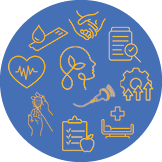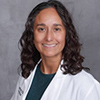April 14-15, 2026
A variety of internal medicine course intensives focusing on selected topics begin before the 3-day meeting

Consider arriving early and add on a course before the main Internal Medicine Meeting 2026 event—or join us just for a course! ACP’s one-, two-, and half-day pre-meeting courses provide an in-depth examination of carefully curated internal medicine topics. Whether you’re enhancing your full Internal Medicine Meeting experience or attending as a standalone educational opportunity, these courses are designed to deliver immediate, practical value to your practice.
Pre-Meeting ACP Internal Medicine Courses take place April 14 to 15 in San Francisco, California.
Pre-Course Pricing Information
Half-Day Course
Wednesday, April 15
NEW! Automated Insulin Delivery: Practical Management for Internal Medicine Physicians (Non-CME Activity)
Wednesday, 8:00 a.m.-noon
Special Inaugural Year Pricing
This intensive, half-day, small group learning program provides an expert-led overview of automated insulin delivery (AID) system use for people with type 2 diabetes, focusing on pump selection, initiation, and management of devices and workflows in clinical practice. Participants will learn to identify appropriate candidates, order and initiate AID therapy, and adjust dosing based on individual system parameters and patient data. Practical strategies for helping people using AID to manage problems with infusion sets and insulin delivery failures as well as to troubleshoot common clinical scenarios will also be covered. Learners will be equipped to educate patients, optimize glucose management, and improve overall outcomes with AID technology. To maximize learning outcomes, participants will be required to complete ACP’s Continuous Glucose Monitoring module and Continuous Glucose Monitoring Practice Cases before the start of the course. This course is supported by educational grants from Insulet and Medtronics.
Learning Objectives:
- Identify appropriate candidates for AID systems based on clinical indicators and patient readiness.
- Understand the principles of AID therapy, including rationale for moving beyond multiple daily-dose insulin regimens, data supporting use, and how insulin pumps and AID algorithms function.
- Select and adjust insulin dosing parameters and pump settings based on individual pump algorithm parameters, patient continuous glucose monitoring data, and patient-specific factors.
- Initiate AID therapy in clinical practice, including choosing devices, navigating barriers to ordering and coverage, onboarding processes, patient education and collaboration with diabetes education and care specialists, and follow-up care.
- Troubleshoot common clinical scenarios, such as infusion set and insulin delivery failures, surgery preparation, exercise (e.g., running a 10K), or unexpected glucose excursions.
Note: The Automated Insulin Delivery: Insulin Pumps for Internal Medicine Physicians Pre-Meeting course is a non-CME activity.
Agenda topics in this Pre-Meeting Course include*:
- Introduction to Automated Insulin Delivery systems: Who, What, Why and When
- Components of Insulin Pump and Integration with Sensor
- Insulin Pump Settings and Calculations
- Hands-on Stations and Scenarios
- Creating your Clinic Infrastructure and Workflow
- What Could Go Wrong?
*Agenda topics subject to change.
Co-Directors

Irl B. Hirsch, MD, MACP
Professor of Medicine, Division of Metabolism, Endocrinology and Nutrition, University of Washington School of Medicine, Seattle, WA

Thomas W. Martens, MD, FACP
Medical Director, International Diabetes Center, Consultant in Internal Medicine, Park Nicollet Clinic, Minneapolis, MN

Gregg D. Simonson, PhD
Director, Care Transformation and Training, International Diabetes Center, Adjunct Assistant Professor, University of Minnesota Medical School, Minneapolis, MN
Faculty

Grazia Aleppo, MD, FACP
Professor of Medicine, Division of Endocrinology, Metabolism, and Molecular Medicine, Department of Medicine, Feinberg School of Medicine, Northwestern University, Chicago, IL

Anders L. Carlson, MD
Associate Executive Director, International Diabetes Center, Minneapolis, MN
One-Day Courses
Tuesday, April 14
Nutrition in Practice: Evidence-Based Strategies for the Internal Medicine Physician
Tuesday, 8:00 a.m.–5:00 p.m.
This course will provide physicians with evidence-based practical knowledge and skills to integrate nutrition into their practice. Renowned experts in the field will share updates based on the latest research. A range of topics will be covered, including culinary medicine, nutrition in chronic disease prevention and treatment, and the role of nutrition in hospital settings. Attendees will learn how to translate nutrition science into practical applications, including cooking, dietary counseling, and providing patients with facts on dietary supplements. This Pre-Course will promote interdisciplinary teamwork, including collaborative care with registered dieticians, and will approach nutrition through an inclusive lens that is respectful of diverse cultures and food traditions.
Learning Objectives:
- Equip physicians with practical skills to integrate nutrition knowledge into their clinical practice.
- Review and apply research-based nutrition strategies for chronic disease prevention and management.
- Analyze the role and impact of macronutrients and micronutrients in patient care.
- Implement effective nutrition counseling techniques in outpatient settings.
- Evaluate the role and application of nutrition support in the care of acutely and critically ill patients.
Agenda topics in this Pre-Meeting Course include*:
- Nutrition: Vital for Physician Education and Clinical Care
- Culinary Medicine Across Cultures: An Evidence-Based Approach to Applied Nutrition
- Culinary Medicine Video Demonstration
- Nutritional Supplements: An Evidence-Based Approach
- Micronutrient Deficiencies: When to Test and How to Treat
- Case Studies in Micronutrients & Supplements
- Malnutrition: Diagnosis & Management
- Healthy Diet: Understanding the Evidence
- Food & Microbiome
- Dietary Approaches for Weight Loss and Diabetes Management
- Tailoring Nutrition for People on Anti-Obesity Medication
- Nutrition Support: Enteral and Parenteral Nutrition
- Nutrition Support Team Case Studies
*Agenda topics subject to change.
Faculty:

Michael Owen-Michaane, MD, MA, PNS, CNSC
Assistant Professor of Medicine at the Institute of Human Nutrition, Assistant Director of Medical Nutrition, Division of Preventive Medicine and Nutrition, Department of Medicine, Columbia University Irving Medical Center, New York, NY

David S. Seres, MD, ScM, PNS, DFASN, FASPEN
Professor of Medicine (Emeritus) at the Institute of Human Nutrition, Division of Preventive Medicine and Nutrition, Department of Medicine, Columbia University Irving Medical Center, New York, NY
Diabetes for Internal Medicine Physicians 2026
Tuesday, 8:00 a.m.-5:00 p.m.
In the United States and around the world, the number of people with diabetes continues to increase, with youth diagnosed with type 2 diabetes and those with type 1 diabetes living to older ages. With obesity and longer durations of diabetes, more people develop microvascular complications as well as cardiovascular disease and stroke. Fortunately, therapeutic options are advancing rapidly, giving greater opportunities to improve the health of our patients, but the complexity of care is also increasing. This course will discuss the diagnosis of prediabetes and diabetes, including atypical forms of diabetes in adults. Faculty will review the role of lifestyle interventions as well as appropriate indications and practical use of weight loss medications. The growing role of diabetes technology will be addressed. The risks and benefits of new insulin and noninsulin pharmacologic therapies will also be presented. The role of diabetes medications, cholesterol-lowering agents, and blood pressure control to reduce cardiometabolic risk will be thoroughly discussed.
Learning Objectives:
- Review current guidelines for the management of patients with diabetes and prediabetes.
- Provide guidance on the evaluation, classification, and treatment of diabetes, including less common atypical forms of diabetes.
- Review new insulin products and diabetes technology (including new pens, pumps, and sensors) available for patients with type 1 and 2 diabetes.
- Review the rapidly expanding role of noninsulin therapeutics in the management of type 2 diabetes.
- Discuss the role of nutrition and medication use for weight management in patients with obesity and diabetes.
- Discuss the prevention and treatment of cardiovascular disease in patients with diabetes.
- Describe appropriate evaluation and evidence-based treatments for metabolic dysfunction-associated steatotic liver disease (MASLD)
- Within a panel discussion format, review questions and challenges that arise in your practice.
Agenda topics in this Pre-Meeting Course include*:
- The Year in Review: Latest Update in Diabetes
- Guideline Based Care of Type 2 DM
- Weight Management Strategies in Diabetes
- Diabetes Technology: Making Life a Little (or a lot) Easier
- Screening and Management of Diabetes Complications
- Cardiovascular Disease: Risk Factor Modification
- Atypical Diabetes
- MASLD for the Internist
*Agenda topics subject to change.
Faculty:

Irl B. Hirsch, MD, MACP
Professor of Medicine, Division of Metabolism, Endocrinology and Nutrition, University of Washington School of Medicine, Seattle, WA
Primary Care Psychiatry: Everything Practicing Internal Medicine Physicians Need to Know
Tuesday, 8:00 a.m.-5:00 p.m.
Internal medicine physicians in specialty and primary care settings frequently find themselves on the “front lines” for the assessment and treatment of common psychiatric disorders. Even though formal psychiatric training for nonpsychiatrists is limited, nonbehavioral specialists treat most psychiatric disorders, prescribing more than 80% of antidepressants.
This course will provide an evidence-informed update designed to teach internal medicine physicians practical approaches to recognizing, diagnosing, treating, and triaging patients with commonly encountered psychiatric disorders. Expert clinician-educators with training and experience in both internal medicine and psychiatry will emphasize the importance of a patient-centered approach, motivational interviewing, simple therapeutic techniques, and practical psychopharmacologic approaches that can be efficiently used in medical settings. The course will focus on psychiatric diagnoses prevalent in general medical practice, including major depressive disorder, anxiety disorders, trauma-related disorders, substance use disorders, insomnia, and bipolar mood disorders.
Learning Objectives:
- Apply practical, patient-centered interview strategies to detect treatable mental illness.
- Describe current best practices for managing psychiatric disorders in primary care and specialty medical settings.
- Describe a practical approach to treating psychiatric conditions in primary care using commonly prescribed and novel psychotropic medications.
- Implement better triage guidelines and communication with psychiatric care providers.
- Apply motivational interviewing techniques to support patient engagement and behavior change.
Agenda topics in this Pre-Meeting Course include*:
- Overview of Psychiatric Comorbidity in Medical Practice and the AMPS Interview
- Beyond Alprazolam: Recognizing, Diagnosing, and Managing Anxiety Disorders in Medical Practice
- Antidepressants: Something Old, Something New, Something Borrowed, and Something Blue
- For the Patient Who Can’t Sleep: Overview of Medications for Insomnia
- Harm Reduction and Evidence-Based Treatment Strategies to Address Addiction in Medical Practice
- Could It Be the Psych Meds? What You Need to Know About the Medications Your Patients Take
- Embracing Ambivalence: Adopting the Spirit of Motivational Interviewing to Improve Medical Practice
*Agenda topics subject to change.
Faculty:

Jane P. Gagliardi, MD, MHS, FACP
Professor of Psychiatry and Behavioral Sciences, Professor of Medicine, Division of Psychiatry and Behavioral Sciences, Division of Medicine, Duke University School of Medicine, Durham, NC

Robert M. McCarron, MD, DFAPA, FAIHM, ACP Member
Director of Education, Susan Samueli Integrative Health Institute; Associate Dean, Continuing Medical Education; Founding Director, UC Irvine Train New Trainers (TNT) Primary Care Fellowships; Director, Health Education to Advance Leaders in Integrative Medicine (HEAL-IM); Professor, Department of Psychiatry and Human Behavior, University of California, Irvine School of Medicine, Irvine, CA
Wednesday, April 15
Cardiology for the Internal Medicine Physician 2026: “The Key Points”
Wednesday, 8:00 a.m.-5:00 p.m.
This course will provide a focused update of the diagnostic, preventive, and therapeutic approaches to the patient at risk for, or with known, cardiovascular disease. Expert clinician-educators will focus on the cardiovascular disease issues that internal medicine physicians most frequently encounter and will provide “Key Points” to update the audience and foster patient care. Subjects covered will include identification and management of acute and chronic coronary artery disease; optimal treatment of acute and chronic heart failure; update of the treatment of hypertension; risk assessment and risk reduction for the patient with cardiac disease who undergoes noncardiac surgery; approach to the patient with valvular heart disease; indications for and interpretation of advanced cardiac imaging methods; atrial fibrillation update; approach to the patient with lower-extremity peripheral vascular disease; when to suspect and how to evaluate and treat cardiac amyloid; and electrocardiogram case review.
Learning Objectives:
- Update the internal medicine physician on the diagnostic and therapeutic approaches to the patient with known cardiovascular disease.
- Become familiar with the guidelines and recent studies regarding hypertension, valvular heart disease, optimal blood pressure control, and care of the patient with cardiovascular disease who undergoes noncardiac surgery.
- Understand approaches for decreasing the risk for complications and decreasing hospital readmissions for patients with a variety of cardiovascular issues.
- Become familiar with optimal surgical/invasive and pharmacologic treatments for the care of patients with coronary artery disease, heart failure, valvular heart disease, and atrial fibrillation.
- Become familiar with the transition of care after hospital discharge for patients with a variety of cardiac issues.
- Become familiar with the role of technologic advances in cardiac care that the internal medicine specialist may use in patient care: electrocardiography, echocardiography, cardiac CT imaging, cardiac MRI, cardiac PET scan, wearable cardiac rhythm monitoring devices, and laboratory testing.
- When to suspect and how to evaluate and treat the patient with cardiac amyloid.
- Become familiar with the latest approaches to the diagnosis and treatment of peripheral vascular disease.
Agenda Topics in this Pre-Meeting Course Include:
- Acute Coronary Syndrome: What is happening in the ED, CCU, Catheterization Laboratory
- Atrial Fibrillation Update
- CHF: The Key Points
- The Post-ACS Outpatient Visit: What Must be on the Agenda
- Noncardiac Surgery for the Patient with Cardiac Disease: Risk Assessment and Risk Reduction
- Cardiac Imaging for the Internist: The “Why and When” of Advanced Cardiac Imaging Modalities
- Valvular Heart Disease
- Leg Swelling When You Have Ruled out Heart Failure and DVT
- Hypertension
- Electrocardiograms You Must Not Miss
- Cardiac Amyloid: When should it be Suspected and How to Plan Evaluation and Treatment
- Selected Cases in Peripheral Vascular Disease (Venous and Arterial)
*Agenda topics subject to change.
Faculty:

Howard Weitz, MD, MACP, FRCP (Lond.), FACC
Bernard L. Segal Professor of Clinical Cardiology, Senior Associate Dean, Sidney Kimmel Medical College at Thomas Jefferson University, Philadelphia, PA

Gregary D. Marhefka, MD, FACP, FACC
Professor of Medicine, Director, Medical Cardiovascular Intensive Care Unit, Division of Cardiology, Department of Medicine, Sidney Kimmel Medical College at Thomas Jefferson University, Philadelphia, PA
Geriatrics and Palliative Medicine for Internal Medicine Physicians
Wednesday, 8:00 a.m.-5:00 p.m.
With an increasing aging population worldwide and a shortage of specialty geriatrics and palliative care clinicians, there is a pressing need to improve the geriatric and palliative care skills of internal medicine physicians who have a central role in the care of older and seriously ill patients. This course will focus on practical, evidence-based strategies that the internal medicine physician can use across care settings to better identify and treat serious and chronic conditions common to older populations, such as cognitive impairment; function assessment, frailty, and falls; depression and anxiety; and hazards of hospitalization. Expert faculty will discuss primary palliative care approaches, including strategies for clinical decision making and deprescribing in the setting of complex medical conditions; providing a systematic approach to pain and symptom management; applying principles of prognostication to those with serious illness and advanced age; and serious illness communication skills.
Learning Objectives:
- Discuss how disease manifests differently in older adults and disease management in older adults using the Geriatrics 5Ms (mind, mobility, medications, multicomplexity, and what matters most) approach.
- Identify the key elements of the Age-Friendly Health System's Framework.
- Integrate Age-Friendly Health System principles into clinical decision making to improve outcomes and quality of care for older adult patients.
- Define frailty and its relevance to health care for older adults.
- Review options for transitions of care for older adults and those with serious and chronic illness.
- Review strategies for medication management and deprescribing in older adults.
- Gain an understanding of palliative care management of common symptoms, including pain, depression, and communication strategies around complex medical conditions.
Agenda Topics in this Pre-Meeting Course Include:*
- The 5Ms as a Geriatrics Approach
- Hazards of Hospitalizations
- Function Assessment, Frailty, and Falls
- Cognitive Impairment for Internal Medicine Physicians
- Prognosis, Advance Care Planning (ACP), and Serious Illness Communication (SIC)
- Primary Palliative Care Approach & Topics
- Pain Management
- Anxiety & Depression in the Aging Population
- Strategies for Clinical Decision Making and Deprescribing
*Agenda topics subject to change.
Faculty:

Helen Fernandez, MD, MPH
Professor, Vice Chair, Education, Brookdale Department of Geriatrics and Palliative Medicine, Icahn School of Medicine at Mount Sinai, New York, NY

Sonia Malhotra, MD, MS, FAAP, FAAHPM, FACP
Associate Chief, Palliative Medicine; Medical Director of Palliative Medicine, LCMC Health, Division of Palliative Medicine, Department of Medicine, Tulane University School of Medicine/LCMC Health, New Orleans, LA
Hospital Medicine: Success in a Complex Environment
Wednesday, 8:00 a.m.-5:00 p.m.
The hospital is a complex environment. Navigating it on behalf of our patients requires a broad and constantly growing body of clinical knowledge combined with an understanding of the systems that support them. This course will provide an update on key medical issues, take you through the challenges of common and uncommon clinical conundrums, and address how to improve the value of care we provide to our patients.
First and foremost, we will keep in mind the needs of the patient as well as the effect on the hospital and hospitalist. Individual lectures will include review of up-to-date medical care using a case-based format and audience-response polling. This course will present an advanced and practical perspective of hospital medicine.
Learning Objectives:
- Review inpatient management of complex patients in case-based presentations.
- Explore conflicts in the management of patients with suspected impairment in medical decision making.
- Provide updates on the latest hospital medicine literature.
Agenda topics in this Pre-Meeting Course include*:
- Electrolyte Management
- Hospital Updates
- Palliative Care Consultations
- Nephrology Updates
- Ethics consultations
- Preoperative Assessment
- Geri-psych Consultation
- Post Operative Complications
- Frailty Assessments and Inpatient Osteoporosis
- Infectious Disease Updates
- Narrative Medicine Lagniappe
*Agenda topics subject to change.
Faculty:

James Newman, MD, MHA, MACP
Associate Professor, Internal Medicine, Medical History, and Health Care Administration, Department of Hospital Medicine, Mayo Clinic, Rochester, MN

Rachel Hammer, MD, MFA, ACP Member
Assistant Professor, Departments of Internal Medicine and Psychiatry, Tulane University, New Orleans, LA
ACP Quality Improvement Leadership Training: Best Practices to Achieve Meaningful and Sustainable Improvement
Wednesday, 8:00 a.m.-5:00 p.m.
ACP's annual quality improvement (QI) leadership training program provides meaningful QI implementation support based on principles of clinician engagement, patient and family partnership, team-based care, promotion of health equity, and promotion of clinician well-being. Participants will receive step-by-step guidance, based on the ACP QI approach, to help them through their QI journey, including how to establish the what and why for change, identify how to measure change, plan for change and identify solutions, and implement and sustain change.
Participants will have the opportunity to work in small groups to design their own QI action plan to address their top practice challenge(s) under the guidance of national expert physician coaches. At the conclusion of this course, participants will be able to understand and apply QI strategies to tackle a wide range of practice issues that are meaningful to their highest priority challenges. This full-day course will launch participants on their QI journeys and provide them with the skills needed throughout their careers and to lead the way through the changing tides of health care.
Learning Objectives:
- Describe the four steps of the ACP QI approach, including establishing the what and why for change, identifying how to measure change, planning for change and identifying solutions, and implementing and sustaining change.
- Explain the rationale for integrating clinician engagement, team-based care, patient and family partnership, promotion of health equity, and promotion of clinician well-being.
- Identify and apply practical strategies for QI implementation using ACP resources and tools.
Agenda topics in this Pre-Meeting Course include*:
- High-level Goal-Setting: What Do You Hope to Accomplish Today?
- Roadmap for the Day: ACP's QI Approach
- Establish The What and Why for Change
- Building a Team: Identifying Key Stakeholders and Developing an Appropriate Communication Plan
- Current State Assessment and Setting Aims
- Measuring Change
- Planning for Change: Identifying Causes and Solutions
- Implementing Change: Focus on PDSA
- QI Shuffle
- Summing it Up: Dissemination Opportunities and Finishing your QI Projects
*Agenda topics subject to change.
Faculty:

Julie L. Oyler, MD, FACP
Professor, Division of General Internal Medicine, University of Chicago, Chicago, IL

Darlene Tad-y, MD, MBA, SFHM, FACP
Professor of Medicine, Division of Hospital Medicine, University of Colorado School of Medicine, Aurora, CO
Two-Day Courses
Tuesday and Wednesday, April 14-15
ACP Rapid Board Review 2026
Tuesday and Wednesday, 8:00 a.m.-5:00 p.m.
Whether preparing for the initial board examination or refreshing your knowledge for maintenance of certification, this popular 2-day course provides an effective, fast-paced overview of core topics in internal medicine designed to focus on material that has a high probability of being included on the ABIM General Internal Medicine examinations. Taught by a faculty of clinician-educators, each an expert in their subspecialty, this condensed, high-yield review uses audience-response polling to actively engage participants and allow them to compare their answers with those of their peers. Each topic is introduced with a clinical case and a related multiple-choice question, the rationale for the correct answer is explained, and key clinical points are emphasized to promote learner retention. Participants also receive valuable tips for successful test-taking strategies included with course materials. This course is an efficient way to prepare for an ABIM examination if you are short on time and seek a high-quality review.
Learning Objectives:
- Enhance your knowledge of internal medicine by working through challenging clinical cases and questions guided by expert faculty.
- Become adept at working through examination-type questions logically and successfully.
- Implement changes in clinical practice in accordance with recent advances and evidence-based guidelines.
Agenda topics in this Pre-Meeting Course include*:
- Cardiology
- Endocrinology
- Gastroenterology
- General Internal Medicine
- Hematology & Oncology
- Infectious Diseases
- Neurology
- Nephrology
- Pulmonary-Critical Care Medicine
- Rheumatology
*Agenda topics subject to change.
Faculty:

Fred A. Lopez, MD, MACP
Professor of Medicine, Department of Internal Medicine, Louisiana State University Health Sciences Center, New Orleans, LA

Cynthia J. Brown, MD, MSPH, FACP
Professor and Chair, Department of Medicine, Louisiana State University Health Sciences Center, New Orleans, LA
POCUS: Foundational Skills for Internal Medicine Physicians
Tuesday and Wednesday, 8:00 a.m.-5:00 p.m.
Registration will close on April 8
This hands-on 2-day course is designed to teach core POCUS skills to internal medicine physicians, centering on the skills needed to use ultrasound as a patient assessment tool in a variety of settings.
If you are interested in the potential for POCUS to expand your clinical reasoning skills, join this course taught by internationally acclaimed faculty. Online prelearning assignments and live lectures will provide a comprehensive foundation of core ultrasound knowledge. Using a small-group, hands-on format, attendees will practice ultrasound scanning on live models to support the development of bedside image acquisition skills.
Learning Objectives:
- Identify indications and rationale for performing the following examinations: pulmonary ultrasound, focused cardiac ultrasound, kidney and bladder ultrasound, evaluation of abdomen for free fluid and aortic aneurysm, and evaluation of lower extremity for deep venous thrombosis.
- Perform the ultrasound examinations listed above.
- Interpret normal and abnormal images for the applications listed above.
- Interpret POCUS findings in clinical case scenarios.
- Describe the principles of ultrasound operation, artifacts, and image optimization.
Note: This is a POCUS foundation course. Internal medicine physicians who complete this course will meet prerequisite training requirements for enrollment in additional internal medicine POCUS courses that will be offered by ACP. Visit acponline.org/pocus for more information.
Lectures followed by Scanning Time covering the following topics*:
- Abdomen and Genitourinary
- Pulmonary
- Cardiac Basics & IVC
- Hybrid Exam
- Cardiac Next Steps
- DVT & Aorta
- In addition, faculty will present cases and review images.
*Agenda topics subject to change.
Faculty:

David Tierney, MD, FACP
Program Director, Internal Medicine Residency, Director, Internal Medicine Bedside Ultrasound (IMBUS) Program, Departments of Graduate Medical Education, Abbott Northwestern Hospital - Allina Health, Minneapolis, MN

Noelle Northcutt, MD, FACP
Associate Professor, Division of Hospital Medicine, Denver Health, Aurora, CO